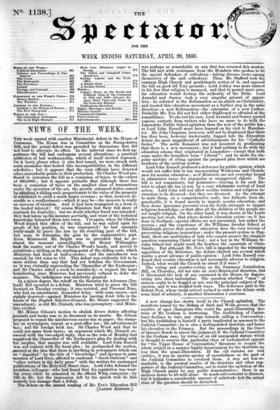A new change has shown itself in the Church agitation.
The manifesto issued by the Bishop of Bath and Wells proves that the number of open champions who resist the quasi-Dissenting doc- trine of Mr. Gorham is increasing. The Archbishop of Canter- bury declines to take any steps towards calling a Convocation : but the Archbishop is himself a party implicated as assessor to the Judicial Committee ; he is also a distinguished Quietist, and hence his elevation to the Primacy-. But the proceedings in the Court of Queen's Bench to arrest the judgment of the Judicial Committee in the Gorham case, by virtue of an old tuirepealed statute which is thought to reserve this particular class of ecclesiastical appeals for "the -Upper House of Convocation," threatens to reopen the whole subject in. a manner highly inconvenient for the Quietists no less than the quasi-Dissenters. If the old statutes are real entities, it was an unwise species of onesMedness on the part of the Judicial Committee to overlook them. A step not less re- markable is the avowed resolve of the Quietists and other sup- porters of the Judicial Committee, not to resist the agitation of the High Church party by any public demonstration : there is an anxious desire to let well alone. So much self-restraint is discreet, but it indicates a considerable amount of solicitude lest the actual state of the question should be disturbed.


























